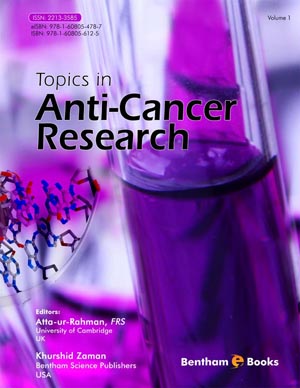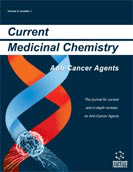Abstract
The current anticancer drugs used in human therapy cause toxic or side effects that can lead to a reduction in the amount of medicine to be administered and, in some cases, discontinuation of the therapy. This fact leads to an increase in the growth of the primary tumor and/or the occurrence of metastasis. For this reason, the development of new anti-cancer drugs with fewer side effects is needed. Evidences from clinical and preclinical studies indicate that COX-2–derived prostaglandins participate in carcinogenesis, inflammation, immune response suppression, apoptosis inhibition, angiogenesis, and tumor cell invasion and metastasis. Patents and articles on anti-cancer effect of anti-inflammatory drugs are discussed in this chapter. Some recent anti-cancer drugs are based on selective COX-2 inhibitors and derivatives synthesized from them. This may be the way for new anti-tumor drugs with lower side effects. Selective COX-2 inhibitors are being mixed with new anti-cancer drugs in order to obtain better results in regression of tumors. Natural products such as resveratrol and SB-73 are selective COX- 2 inhibitors and have anti-inflammatory and anti-cancer properties.
Keywords: Arachidonic acid, aspirin, breast cancer, cancer, cancer symptoms, cancer treatment, colon cancer, cyclooxygenase enzyme, cyclooxygenase inhibitors, cyclooxygenase pathway, indomethacin, lung cancer, magnesium, melatonin, nonsteroidal antiinflamatory drugs, pancreatic cancer, prostate cancer, omega 6, resveratrol, selective COX-2 inhibitors, sumatriptan, tumor.






















